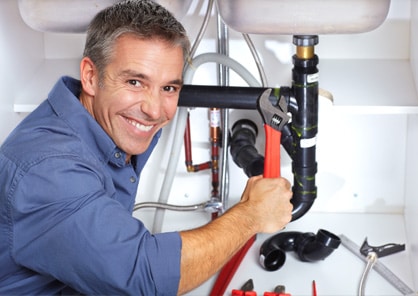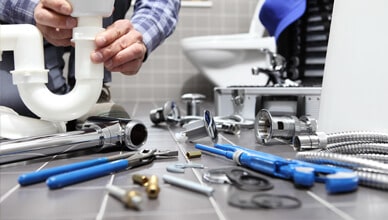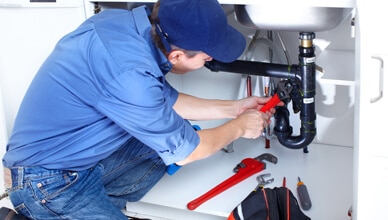University Headquarters (HQ) is an industry-leading, independent educational organization that provides independent college rankings using a proprietary formula to create first class unbiased rankings. The team at University HQ strives to provide accurate and trustworthy rankings that highlights the best programs for plumbers.
Get Matched With Online Plumbing Trade Colleges
Plumbers work with systems that carry water, wastes, and natural gas to and from homes, buildings, or other types of structures. In residential settings, they handle water, gas lines, waste systems like toilets and septic disposal. In commercial construction, plumbers can work as contractors or parts of a subcontractor crew. They can take on substantial parts of the gas and water system installation. Plumbers can handle finishing work such as sinks, toilets, tubs, and fixtures.
Plumbers can work as employees of specialized plumbing companies or as part of a broader type of repair or construction company. Many plumbing professionals work full or part-time as independent businesses. In any capacity, they must keep abreast of technological changes and revisions or additions to codes, business regulations, and consumer rules. When licensed, plumbers must maintain all requirements including refresher courses and continuing education. Plumbers can establish local reputations for excellence and create a high demand for their services. A career in plumbing can be well-paid and exciting. It is a people-oriented business in terms of dealing with clients, customers, and coworkers.

Components of A Successful Plumbing Career
To become a plumber you will need technical plumbing skills and knowledge that come from high-quality education and a period of apprenticeship or other types of supervised training. Most plumbers work three to four years under supervision before working independently. University Headquarters understands that, in addition to the hard skills, there are soft skills that contribute to a successful plumbing career.
- Listening skills are essential for plumbers that must work with customers, clients, and other professionals. The ability to listen is a foundational skill for learning about a situation and developing solutions.
- Plumbers must be able to think critically. They must assess problems and develop solutions. They must also communicate their ideas to other people in clear and understandable terms.
- Physical strength is part of the requirements for a successful plumber. However, while some pipes and materials are quite heavy, plumbers do not need to be exceptionally strong. They do need to be fit, have good conditioning, and have dexterous hands. Lifting, bending, and stretching is part of the job. Plumbers may have to work in small or cramped spaces and at awkward angles.
Compare Popular Online Plumbing Trades Programs
Overview of Plumbing Certifications and Training Options
-
Get a high school diploma, GED, or another equivalent
-
Get a solid foundation in math. Plumbers must use mathematics and arithmetic and measures like fluid volume
-
Enroll in an apprenticeship plumbing program or other public, private, or employer-sponsored training program to get hands on training or online training
-
Complete a plumber apprenticeship training of three to four years
-
Get a journeyman license or equivalent certification.
-
Get a Master Plumber license or certification.
What Does A Plumber Do?

Plumbers perform installations of water plumbing systems and water treatment systems. They install residential and commercial systems like spas, hot tubs, and swimming pool water lines. A plumber works with sewage systems and other types of wastewater removal. Plumbers also perform residential installations and repairs of household plumbing systems. They resolve clogs and replace damaged pipes. Socially conscious consumers and clients may seek Green solutions to household plumbing issues, installations, and new construction. Plumbers can provide specialized services that use Green or sustainable techniques and products.
Typical Plumbing Trade School Requirements
Plumbing apprenticeship programs and trade schools do not have a standard or national set of requirements. These sponsors and trade schools each determine the applicant requirements. The typical requirements include a high school diploma, GED, or other equivalent proof of education. Typically, students must be age 18 or older or have parental consent.
Candidates with strong backgrounds and aptitudes for science will have an advantage to become a plumber. Plumbing programs teach concepts based on mathematics, fluid dynamics, and materials science. They must understand concepts like expansion and the effects of heat and cold on metals, plastics, other materials and plumbing code. Plumbing trainees that plan to work on new installations must learn to read blueprints and other layout information and understand sanitary and plumbing codes.
Typical Plumbing Certifications Needed
Plumbers must complete a training program or apprenticeship (online or on-campus) to qualify as journeyman plumbers. Most states have a further classification of Master Plumber. Plumbers must be licensed in most states. States can require exams and other demonstrations of skill for certification. All states require supervised experience to move from apprentice to journeyman status; the typical range is two to four years of supervised field experience.
A plumbing school student must be in good standing academically from the previous level of education. They must demonstrate good character and the ability to comply with school or program rules and procedures. High school students should have a strong background in mathematics and science. All potential trainees should have a basic familiarity with computers and the ability to use standard computer software for communications, records, and online study.
Is an Exam Needed for a Plumbing Certification?
There is no national exam for plumbing industry professionals. States control the licensing procedure for professionals that hold themselves out to the public as plumbers. Many states use journeyman-level exams to qualify experienced apprentices or applicants that graduated from plumbing vocational schools or community college plumbing programs.
Online Plumbing Education & Certification Options
Online plumbing trade schools offer general plumbing training classes and knowledge. They can equip graduates with basic skills for working with piping systems for water, gas, steam, and sewage. The major fields include pipefitting, steamfitting, heating, ventilation, and air conditioning. Another area of high interest is in Green technology, in which plumbers design and install efficient systems with favorable environmental impacts.
Plumbing Industry
This type of online program prepares individuals to practice as licensed plumbers. Plumbing industry professionals use technical knowledge and skills to lay out, assemble, install, and maintain piping fixtures and systems for water, steam, natural gas, hot water, heating, cooling, drainage, in home and business environments.
Sample Online Courses and Classes
- Construction Management
- Heating, Air Conditioning, and Ventilation Maintenance
- Plumbing Technology
- Plumber Code
Costs
- Certification: approximately $3,000 per year
- Associate Degree Tuition $3,000–$15,000 per year
Pipefitting
A pipefitting program prepares individuals to practice as licensed plumbers by applying technical knowledge and skills to lay out, assemble, install, and maintain piping systems for steam, natural gas, oil, hot water, heating, cooling, drainage, lubricating, sprinkling, and industrial processing systems in residential, commercial, and industrial settings.
Sample Online Pipefitting Courses and Classes
- Pipe System Types and Design
- Equipment and Materials
- Pipefitting Safety Standards
- Technical Measuring and Math for Pipefitters
- Pipefitting Terminology and Communication Strategies
Costs
- Certification: approximately $3,000 per year
- Associate Degree Tuition $3,000–$15,000 per year
Steamfitting
This type of plumbing program that prepares individuals to apply technical knowledge and skills to lay out, assemble, install, and maintain piping fixtures and systems for steam, oil, hot water, heating, and industrial processing systems in residential locations, commercial installations, and construction environments.
Typical Steamfitting Courses and Classes
- Blueprint Reading
- Drafting and Sketching
- Pipe Welding
Range of Costs
- Certification: approximately $3,000 per year
- Associate Degree in Plumbing Technology Tuition $3,000–$15,000 per year
Find Your Online Plumbing Trade School
Careers & Salaries for Graduates
Plumbing Median Salaries by Occupation
| Occupation | Entry-Level | Mid-Career | Late-Career |
|---|---|---|---|
| Boilermaker, Pipe Fitter | $49,100 | $60,100 | $82,100 |
| Building Inspectors | $43,600 | $54,700 | $58,700 |
| Plumber | $39,300 | $54,300 | $60,500 |
| Lead Plumber/Foreman | $41,000 | $62,000 | $63,300 |
| HVAC Installer | $33,000 | $46,000 | $50,000 |
*Plumbing job salaries provided by the Bureau of Labor Statistics and PayScale
Important Questions to Ask (FAQ)
How long does it take to earn a plumbing diploma or certification online?

How much does an online plumbing trade school cost?
The price of plumbing trade schools varies by the institution, and the range is very wide. An online associate degree in plumbing technology from a community college can range from about $3,000 to more than $20,000. Trade schools differ from community colleges in that they do not offer as much general training and focus more on hands-on training for a business or trade.
The average tuition for public community colleges is about $3,500; many locations have low or no-cost tuition options for residents of a state, city, or county.
How many students graduate on time?
The graduation rate for a student at a two-year degree or certificate programs is 30% according to the National Center For Education Statistics. Overall, the trend in learning a trade career is moving towards longer completion times. In the case of trade and vocational schools for plumbing, many students will not attend full-time, and that can extend the average time for completion without reflecting on the student’s effort.
Why consider accreditation?
The US Department of Education recognizes the Accrediting Commission of Career Schools and Colleges (ACCSC) as the accreditor for post-secondary degree and non-degree institutions. The ACCSC specializes in schools that mainly educate students for occupational, trade, and technical careers. The organization also accredits institutions that offer career programs through distance and online learning.
Employers and educational institutions widely accept ACCSC accreditation. Potential candidates should make sure that the schools or vocational programs they select have accreditation from an agency approved and recognized by the US Department of Education.
Choosing an accredited online school
University Headquarters strongly recommends the selection of an accredited school or program. Apprenticeship programs operated through trade associations or unions will provide technical training that will meet or exceed state licensing requirements. When selecting a two-year or four-year school or college, the school must be regionally accredited or accredited by a Department of Education-approved organization. By receiving a diploma or certificate from an accredited program will increase your changes to obtain a post graduate job.
Online vs. classroom
Many students prefer to attend school in a classroom or online. Some prefer to attend online and use on-campus locations as they can. Today, a student can complete a degree completely online with local internships and onsite practice sessions. Online college can work for students that have responsibilities they cannot leave to attend school and wish to attend full or part-time from home.
Does the online school provide job placement assistance?
A potential student should examine the resources and activities that each potential school offers for job placement and career assistance. Schools and apprenticeship diploma programs are in the ideal position to help with getting a job as a plumber, internships, and career development. In the plumbing field, experience is a vital step for going forward to journeyman and master plumber status. When working in non-union environments, employer or employer associations can provide training and valuable assistance in career guidance and job placement.
Consider the rankings of the online school
The school that students select can boost their career and help with early job placement if it is well-known for its quality education. The school rankings involve factors that reflect the quality of the diploma program that each school provides. Rankings include the school's retention rate, graduation rate, and acceptance rates. They also look at the starting salaries of recent graduates. Highly ranked schools reflect things that interest employers and they produce graduates that have the knowledge and skills that employers need for job placement.
What skills are needed?
Plumbing students should be able to work with basic computer software applications for writing and rendering. They must be able to communicate effectively about drawings, blueprints specifications, agreements, and other types of industry code.
In addition to reading blueprints, drawings, and schematics, plumbers must learn building, fire, and safety codes and regulations. They must be able to access reference materials associated with rules and regulations including official permits.
Potential scholarships
-
Association of Women Contractors
Amount: $1,000
Deadline: April 30
The Association of Women Contractors offers a scholarship for women residing in Minnesota to attend a two-year, four-year, technical, or vocational school. A student should demonstrate financial need along with good academic performance, work experience, and career goals in the construction or the construction trades including plumbing.
-
Davis Memorial Scholarship
Amount: $5,000 (Up to 20 Awards)
Deadline: Varies (Previously April 9)
This scholarship awards funds with a priority on students that seek to attend a trade or vocational school. The program awards four-year students that seek a degree in construction or a construction related field. The program criteria use personal goals, experience, and educational achievement to select applicants for assistance.
-
Horatio Alger National Career & Technical Scholarship Program
Amount: Up to $2,500
Deadline: June 15
Horatio Alger National Career & Technical Scholarship Program is a scholarship that can help plumbing students with plans to enroll at a non-profit post-secondary institution in the fall following high school graduation. Eligible applicants must demonstrate financial need. The program places priority on students that have overcome personal obstacles and have managed to seek higher education in college, trade, or vocational schools.
-
Association of Women Contractors – Apprenticeship Scholarship programs
Amount: $1,000
Deadline: April 30
Applicants must be Minnesota residents or working for a Minnesota construction company. The apprenticeship scholarship is open to women currently working at the apprentice level. Applicants may be eligible if graduating their trade or training program in the spring of 2019 a3d intending to start as an apprentice.
